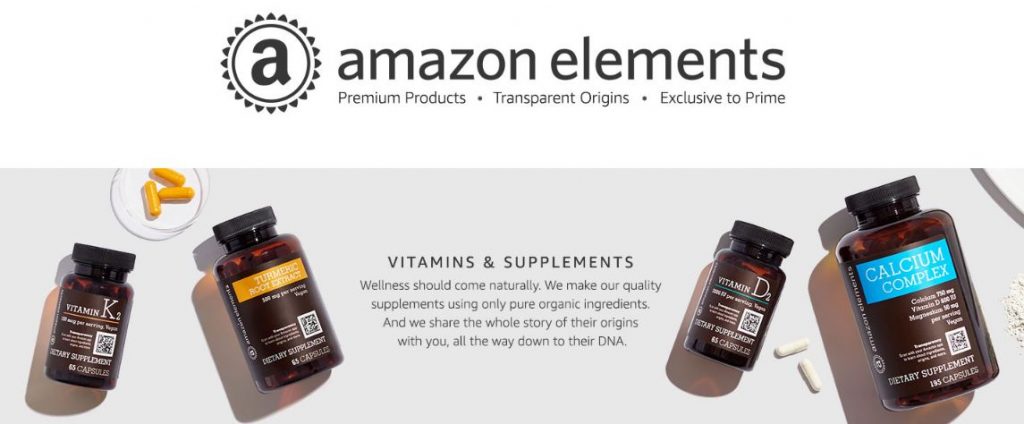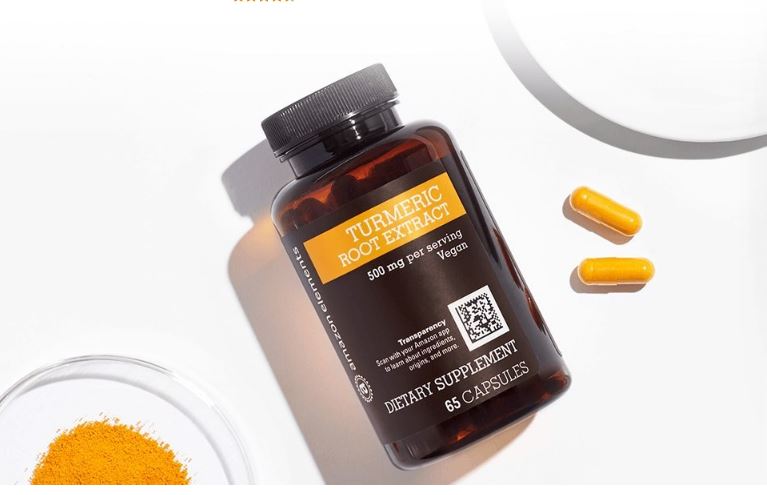Will Amazon Elements Drive Out Supplement & Vitamin Sellers?


Earlier this week, Amazon quietly premiered their new line of private label supplements and vitamins, housed under the “Amazon Elements” brand.
In addition to high quality detail pages and impressive packaging, it appears Amazon’s latest endeavor is also trying to set a new standard by pushing product transparency in this category to help improve customer trust and raise the bar on expectations.

Amazon Elements isn’t necessarily new. The private label initially launched in 2014, but later discontinued their diaper category.
Since, Amazon Elements hasn’t gained much traction and was seemingly put on the back burner to focus on other upcoming Amazon private label launches including Happy Belly (coffee, eggs, nuts), Wickedly Prime (grocery, gourmet foods), and their recent addition – Buttoned Down, an Amazon manufactured menswear line featuring basic dress shirts exclusively for Prime Members.
If you are actively selling products in the Amazon Health and Personal Care category, you’ve probably noticed an increase in competition, not to mention the fact it’s now much harder for new sellers to get access than it was 4 or 5 years ago.
In our blog analysis, “Amazon Health & Personal Care: Why Is It So Hard to Get Approved?” we talk about why Amazon makes it difficult to get ungated in this category on purpose.
One reason is Amazon recently added new requirements for sellers in this category:
Now, sellers must list all ingredients for over-the-counter medicines and dietary supplements on the backend. Sellers must also show the back of the packaging (ingredients and nutritional information) as the second image on product listings (by February 2017).
The main takeaway: Counterfeit products with unauthorized ingredients can pose a serious health risk, and these new requirements will likely deter careless or counterfeit sellers.
Although the introduction of Amazon’s supplement & vitamin private label doesn’t come as a huge surprise, it does raise concern for sellers advertising in the health category.
We sat down with our team of Amazon experts to find out:
 “While the initial product rollout is limited to Turmeric Root Extract, Calcium Complex, Vitamin D, and Vitamin K, I view this as a significant move on Amazon’s part which will undoubtedly disrupt the supplement market on Amazon.”
“While the initial product rollout is limited to Turmeric Root Extract, Calcium Complex, Vitamin D, and Vitamin K, I view this as a significant move on Amazon’s part which will undoubtedly disrupt the supplement market on Amazon.”
“These are the highest quality detail pages I’ve ever seen on Amazon and their focus on quality, authenticity, health, and transparency is communicated effectively through images such as the ones below.
Private label vitamin and supplement Sellers are absolutely going to be worried about what the future holds for them. It will be really interesting to see how quickly Amazon’s products rise up the rankings for key search terms once they become available for sale.”

“Vitamins and supplements are interesting for two reasons:
1) The subscribe and save model exponentially increases a customer’s LTV (lifetime value) which I imagine is very common in this area. That’s a big reason why Amazon bought diapers.com at a premium a few years back. It will be a good test to see how people view “Amazon” as a brand.
2) I imagine people’s perception of Amazon is similar to say Target–not super cheap, not super fancy, but safe and reliable. e.g. you go to Amazon/Target and expect a t-shirt to cost $10-$15, compared to $2 at Ross or $100 at Neiman and Marcus.
 Vitamins are interesting because in theory consumers care about the branding there since it’s something you’re putting in your body in an effort to make yourself healthier.
Vitamins are interesting because in theory consumers care about the branding there since it’s something you’re putting in your body in an effort to make yourself healthier.
It also has no taste and you never actually feel an immediate result from taking Vitamin D, as opposed to say a pre-workout or even cold medicine.
So if you have the option between two Vitamin D bottles, it only comes down to the brand that’s on the bottle and how well that brand markets it.
Amazon for now seems to be positioning itself as the safe, reliable brand like “Dell” or Honda/Toyota rather than say Apple or Tesla/Mercedes/BMW which is a brand you not only buy but represents you as well.
“Amazon is only rolling out their private label supplements and vitamins to Prime members right now (which is a pretty smart audience to test on because of the loyalty they already have with those customers).
Also, they are only featuring 4 products, which is limited. But, I think the real concern for sellers is how quickly and how widely Amazon will expand in this category.
Until this point, we have never seen this quality of detail pages from Amazon before. There’s two full pages worth of image content, which you don’t usually get.
What Amazon is featuring on these detail pages is more advanced than what they’ve roll out to the common public, so supplement and vitamin sellers are essentially competing against some of the most sophisticated content out there.
Fortunately, we (as an agency) have the capabilities and the sophistication to build out really high quality content pages with Enhanced Brand Content (EBC), A+ Content and Brand Pages to allow sellers to differentiate themselves from their competition.
CASE STUDY: How Enhanced Brand Content Improves Conversion Rate for Polaris Optics
The initial objective was to help sellers get a leg up on their competition, but now they need to keep pace with Amazon.
We believe that unless you’re leveraging and using the enhanced content functionality or features – you are quickly going to fall behind.”

FREE GUIDE: The Brand’s Guide To Amazon A+ Content
“What is really interesting to me is that Amazon is tagging these new supplements under their ‘Amazon Elements’ label. A lot of the private label initiatives we’ve seen lately are listed under a different brand name for example, Buttoned Down.
Unless you are an informed shopper or work in the Amazon space, you probably don’t know that is an Amazon private label product. Same thing goes for Happy Belly and Wickedly Prime – where we can see that Amazon decided to remove their name from those private labels.
I think the reason they are now tagging themselves under the Amazon name is because they’re aiming for transparency and ultimately trust.
Amazon knows that is a major factor in the shopper’s buying decision, specifically when it comes to supplements and vitamins. The integrity of the Amazon brand resonates trust with their customers (specially Prime users) and that’s why they are making it exclusive to Prime members first.
Bullet points all feature words like purity, integrity and potency. They are even telling shoppers who the manufacturer is – there’s full transparency.”

“It’s definitely going to shake the private label supplement and vitamin community, and of course with any disruption there is a risk it will push some sellers out of business.
Sellers have cause for concern but they should keep in mind that Amazon is an open marketplace and there is a reason they want it to remain an open marketplace (offering a variety of products & brands).
That being said, Amazon has definitely raised the bar on product content and sellers will have to differentiate themselves to stay competitive in this category.”
Q. Should supplement and vitamin sellers on Amazon be worried?
– Although there is cause for concern, this isn’t necessarily a death sentence for active supplement sellers on Amazon. At this time, Amazon is only marketing 4 supplement and vitamin products. Of course, there is potential for expansion (once Amazon has gathered enough data from their interaction with Prime members).
Q. How will Amazon’s latest private label impact their business?
– Because of the high quality and new level of sophistication Amazon Elements offers Prime members, sellers will need to focus on new ways to make their content & images stand out. Transparency is also a growing trend in the world of supplements and vitamins. Consumers want to buy from trusted brands – the more they know about your products, the better informed they can be when making their choice.
Q. What actionable steps can sellers take to stay competitive?
– To successfully stand out among your competitors – optimize your content by investing in:
